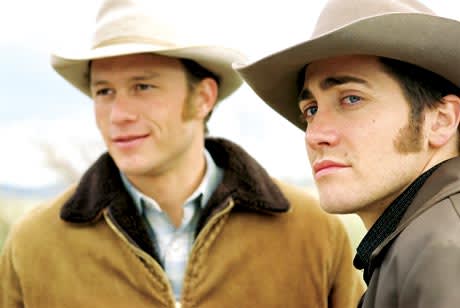The predetermined association that many will have with a film like Brokeback Mountain is that it's simply about "gay cowboys." Though this is essentially true, director Ang Lee (Crouching Tiger, Hidden Dragon), working from an adaptation of E. Annie Proulx's award-winning short story, takes what could have been a novelty act and turns it into a mesmerising and powerful cinematic achievement that pushes boundaries and challenges audiences.
Ennis Del Mar (Heath Ledger) and Jack Twist (Jake Gyllenhaal) meet in the early 1960s when they are forced to spend an entire summer ranching sheep against the elements of the Wyoming wilderness. They quickly come to rely on each other for nearly everything, and their bond takes a carnal turn after a night of excessive drinking. But instead of this incident resulting in awkwardness and distance, the two blindly begin to fall in love. This occurrence becomes the core of the film's focus, as the decades that follow this initial meeting constantly challenge their unconditional emotion.
Brokeback Mountain is not a historiographic account of what it was to be a homosexual in the middle of the 20th century. Brokeback Mountain is about a love between two people that were not allowed to love each other. It does not hold back in any manner, and both Ledger and Gyllenhaal prove their "it boy" status was not unjustified.
Ledger seeps with realistically portrayed raw emotion and Gyllenhaal's subtler performance perfectly complements Ledger's. The belief in their connection is necessary for the rest of the film to work and both actors take a gutsy career move in making that happen.
The cinematography is incredibly grand and often just as enchanting as the story. Lee obviously has put every ounce of his creative drive into this project and the result is a cinematic achievement unlike anything that came before it. (Focus/Alliance Atlantis)
Brokeback Mountain
Ang Lee

BY Peter KnegtPublished Jan 1, 2006